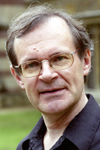Director's Corner
20 July 2006
CERN Council Launches European Strategy for Particle Physics
Today's issue features a Director's Corner from Brian Foster, GDE European Regional Director.
A new strategy document outlining the future directions for particle physics research in Europe was approved unanimously at a special meeting of the CERN Council in Lisbon on 14 July. Symbolically meeting away from the CERN site, the Council was operating in the mode of a strategic body in which European governments can discuss matters affecting all of European activity in particle physics, which includes, of course, the ILC.
A brief précis of the document could be "steady as she goes". The basic European strategy was set in 2001 by the Foa report, the output of a working group under the then Chair of ECFA, Lorenzo Foa. It gave the highest priority to the completion and proper exploitation of the LHC, and confirmed that what has now become the ILC should be the next major project in particle physics. It also recommended increasing the resources for accelerator physics in Europe both to R&D projects and to education and training. All of these threads, plus some extra ones, notably in astroparticle physics, not considered by the Foa review, can be found in the new CERN strategy statement and accompanying document. Once again, highest priority is given to the completion and exploitation of the LHC and strong support is given both to accelerator physics and R&D, particularly towards neutrino factories and CLIC. While one might have preferred the nuances in some parts, particularly in the accompanying document, to have been slightly different, I am particularly pleased by the strong support that the document voices for the ILC. It is worth quoting the pertinent section in full:
"It is fundamental to complement the results of the LHC with measurements at a linear collider. In the energy range of 0.5 to 1 TeV, the ILC, based on superconducting technology, will provide a unique scientific opportunity at the precision frontier; there should be a strong well-coordinated European activity, including CERN, through the Global Design Effort, for its design and technical preparation towards the construction decision, to be ready for a new assessment by Council around 2010."
This is an even stronger statement than that of Foa and in particular the mandate for CERN to be strongly involved in ILC is very significant. As the construction activity on LHC moves towards completion, technological and engineering know-how should become increasingly available for ILC work, even within the rather severe planned loss of CERN personnel. I have been very gratified by the steadily increasing involvement of CERN personnel in the ILC and look forward to an acceleration of this as foreseen in the new strategy.
Since the new strategy so closely resembles its predecessor, one might question the purpose of this exercise. Jointly chaired by Professor Ken Peach (JAI, Oxford) and Professor Torsten Akesson (Stockholm), chairs of the CERN Scientific Policy Committee (SPC) and European Committee for Future Accelerators (ECFA), respectively, the review process involved members of both these bodies as well as nominees for CERN member states in meetings and presentations over a six-month period. It is of the first importance that these conclusions have been arrived at with the active participation of governments and members of national funding authorities under the aegis of CERN Council. The hope is that, having been exposed to the detailed arguments and having agreed unanimously with the conclusions, European governments will now be more likely to follow verbal support with the financial means to put this strategy into full operation.
-- Brian Foster, GDE European Regional Director
